100 Women: Gladys West - the 'hidden figure' of GPS
- Published
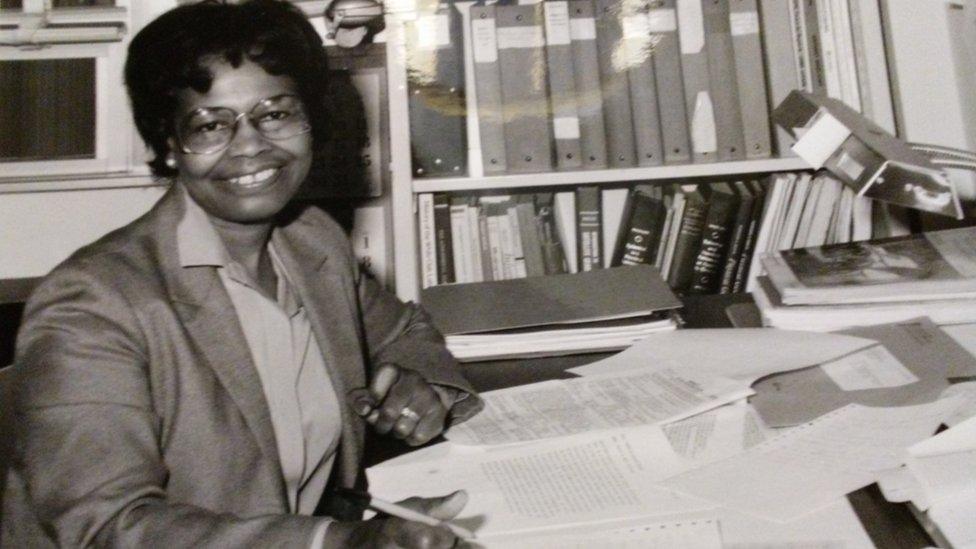
From the sat nav in your car, to the tags on your social media posts, many of us use global positioning systems, or GPS, every day.
Gladys West is one of the people whose work was instrumental in developing the mathematics behind GPS.
Until now, her story has remained untold.
When Mrs West started her career at the Naval Surface Warfare Center in the US state of Virginia in 1956, just one other black woman and two black men worked alongside her.
"I carried that load round, thinking that I had to be the best that I could be," she says.
"Always doing things just right, to set an example for other people who were coming behind me, especially women.
"I strived hard to be tough and hang in there the best I could."
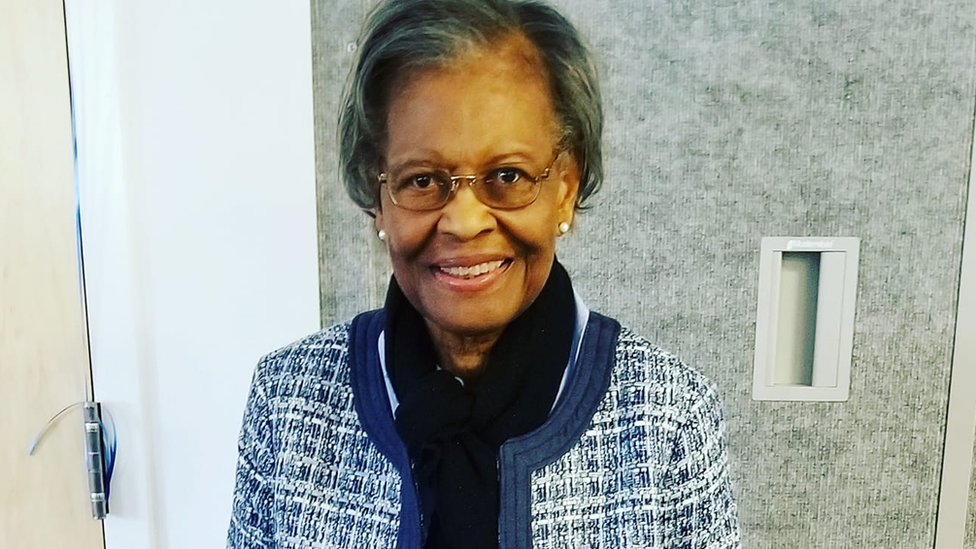
Mrs West was born in 1930, in Dinwiddie County, Virginia - "a real rural kind of a place" as she describes it.
Many of the families around them were sharecroppers - tenants of a farm who had to hand over a proportion of their crops to the landowners.
Her family had their own small farm and she had to work in the fields with them.
"I guess I found that a little bit contrary to what I had in my mind of where I wanted to go," she says.
Mrs West was ambitious; she didn't want to stay picking tobacco, corn or cotton like the people she saw around her.
Neither did she want to work in a nearby factory, beating tobacco leaves into pieces small enough for cigarettes and pipes.
"I thought at first I needed to go to the city. I thought that would get me out of the country and out of the fields," she says.
"But then as I got more educated, went into the higher grades, I learned that education was the thing to get me out."
At her school, people who came top of the class were offered a scholarship to the local university.
Her family "didn't have a whole lot of money" and Mrs West knew this was her one big chance.
She worked hard, graduating first in her high school class, securing her that scholarship.
"When it was time to go to college, I didn't quite know what to major in," she says.
"They were trying to tell me, since I was good at all my subjects, that I should major in science or math or something that was more difficult and meant people didn't major in it."


What is 100 Women?
BBC 100 Women names 100 influential and inspirational women around the world every year. We create documentaries, features and interviews about their lives, giving more space for stories that put women at the centre.
Follow BBC 100 Women on Instagram, external and Facebook , externaland join the conversation.

She took maths, a subject mostly studied at her college by men.
"You felt a little bit different. You didn't quite fit in as you did in home economics.
"You're always competing and trying to survive because you're in a different group of people."
The few female classmates she had went on to careers like teaching. Ms West also taught for a couple of years but her degree meant she had opportunities elsewhere too and she moved on to work at the naval base in Dahlgreen.
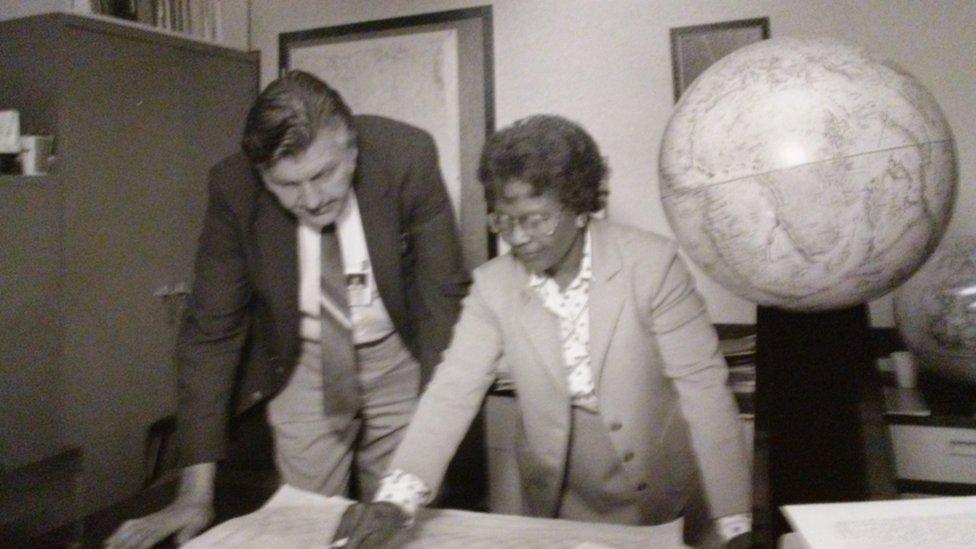
Mrs West would collect and process data from satellites, using it to help determine their exact location.
It was this information that would go on to help develop GPS.
"We would come in and sit at our desks and we would logic away, go through all the steps anyone would have to do to solve the mathematical problem," she explains.
Then she would work with programmers on the functions the massive computers needed to do.
"The operators would call us to tell us our programme was running now and we could come down and watch it," she says.
"So we would come down and watch this big computer churn away. Then you'd get some results.
"Nine times out of 10 they weren't completely right so you had to analyse them and find out what was different to what you expected."
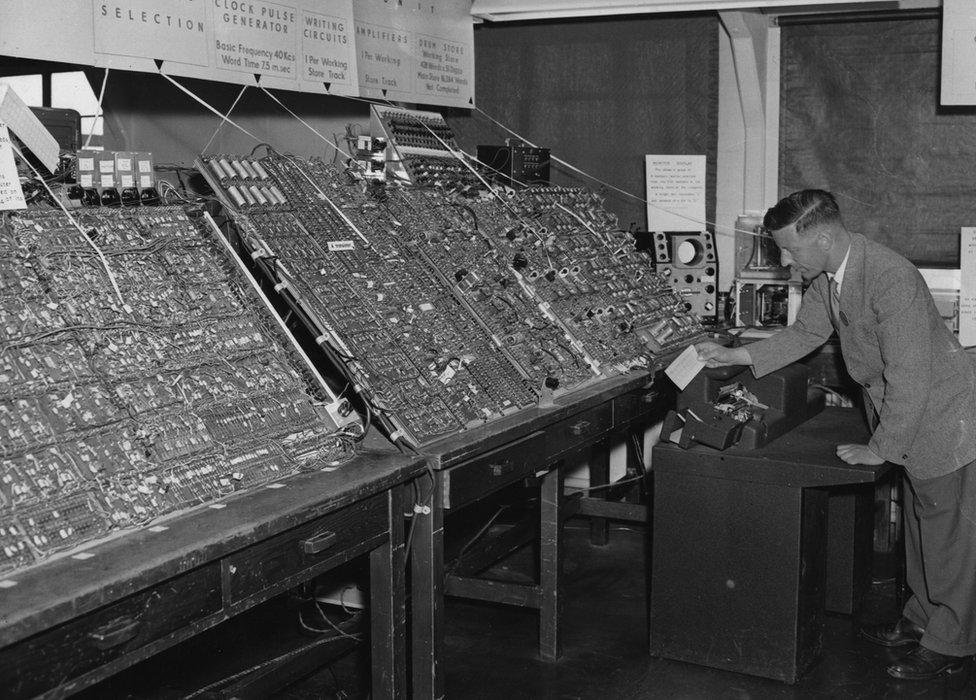
This photo, taken in 1956, shows the enormous size of early computers
At the same time Mrs West was working as a mathematician, the civil rights movement was gaining ground in the US.
The campaign, led by figures such as Martin Luther King and Malcolm X, challenged racism across the country.
More than a quarter of a million people marched to the Lincoln Memorial, to listen to King's "I have a dream" speech.
But Mrs West's work set her apart from that movement.
"It turned out to be somewhat separate for us because we were working for the government and we couldn't do a whole lot of participating in non-government activities off-base," she says.
"We lived on the base and we didn't communicate too well with the community that was around us.
"We didn't get involved with it [the civil rights movement], partly because it wasn't safe because of the job, to do that."
Not long after starting work at the base, Mrs West fell in love with the man who would become her husband - Ira West, one of her two male black colleagues. They married, started a family and have been together for more than 60 years.
She continued working as a mathematician and her hard work was rewarded when she was nominated by her departmental head for a commendation in 1979.
Mrs West was then recommended as project manager for the Seasat radar altimetry project, the first satellite that could remotely sense oceans.
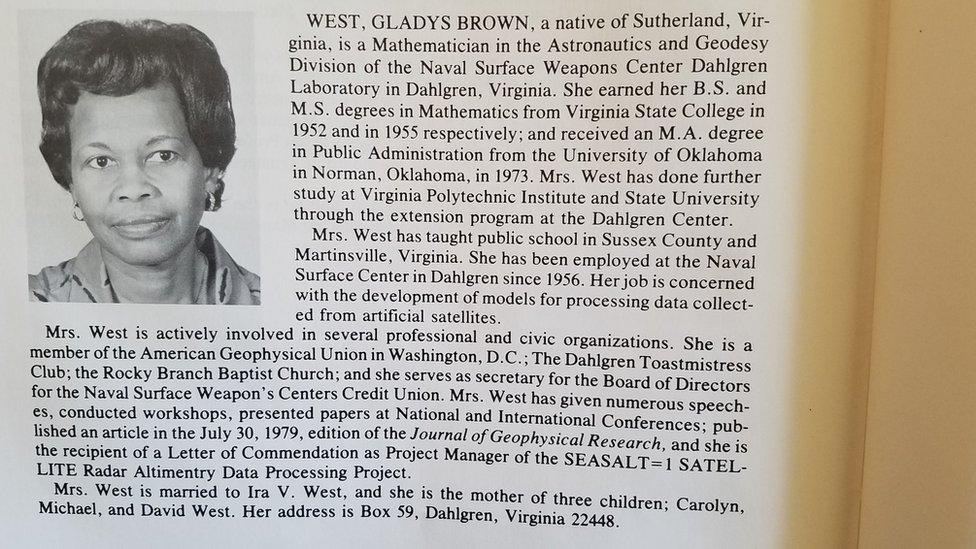
Retiring in 1998, after a career spanning more than 40 years, she and Ira decided to mark this new era in their life by travelling.
And then Mrs West returned to education - working towards a PhD - but suffered a stroke.
It affected her hearing, vision, balance and mobility, and left her feeling miserable.
"All of a sudden," she says, "these words came into my head: 'You can't stay in the bed, you've got to get up from here and get your PhD.'"
Not only has she achieved her PhD, she's also gone on to deal with other challenges to her health, including a breast cancer diagnosis a few years ago.
It was only when a member of her university sorority, Alpha Kappa Alpha, read a short biography Mrs West had submitted for an alumni function, that her achievements were brought into the spotlight.
Since then, articles about Mrs West have appeared in local press, students have done class reports on her and she has been officially recognised by the Virginia Senate.
A joint resolution, passed in February, external, commended her "for her trailblazing career in mathematics and vital contributions to modern technology".
In a message about Black History Month, written in 2017. Capt Godfrey Weekes, then-commanding officer at Dahlgren, said Mrs West played an "integral role" in the development of GPS.
"As Gladys West started her career as a mathematician at Dahlgren in 1956, she likely had no idea that her work would impact the world for decades to come."
"I think I did help," she says, of her becoming a role model for other women.
"We have made a lot of progress since when I came in, because now at least you can talk about things and be open a little more.
"Before you sort of whispered and looked at each other, or something, but now the world is opening up a little bit and making it easier for women.
"But they still gotta fight."